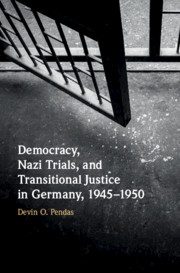‘A vast literature insists that the transition from authoritarianism to democracy demands that a nation frankly reckon with its past crimes. Pendas’s new book brilliantly challenges this view. In exploring Germany’s half-hearted and vexed efforts to punish and purge former Nazis and ‘fellow travelers’, he demonstrates how the German nation achieved an important political success at the cost of a disturbing moral failure. His is a fine and singular achievement.’
Lawrence Douglas - Amherst College
‘Pendas has spun a powerful cautionary tale about transitional justice, a necessary corrective to the idea that liberal-legal trials in the aftermath of atrocity necessarily lead to democratization. As Pendas shows with his usual erudition, the very different political fates of West and East Germany undermine any such happy teleology. An absolute must-read - and will no doubt be read for years to come.'
Kevin Jon Heller - University of Copenhagen
‘This is the definitive account of the ‘Nuremberg interregnum’ … In a tour de force, Pendas takes the reader from Nuremberg to Dachau, Lüneburg, and Waldheim, and to the many places where investigations never made it to trial. Combining a keen eye for detail with analytical rigour, Pendas reasserts historians’ authority on transitional justice’s potential and its limitations. This excellent book shows how unintended consequences and perennially irrational actors defy neat models and precise cost-benefit analyses.’
Kim Christian Priemel - University of Oslo
‘Pendas has written a deeply researched and conceptually sophisticated book … Pendas’ insightful and important book will interest a wide scholarly audience, especially theoreticians of transitional justice, scholars of human rights, historians of the Holocaust, and specialists in modern German history.’
Charles B. Lansing
Source: Journal of Interdisciplinary History
‘… writing soberly, thoughtfully and astutely, Pendas strikes at the heart of the notion of transitional justice by arguing that its actual unfolding in a formative time and place shakes the ground beneath the generally accepted theory of its happily democratizing power.’
Douglas G. Morris
Source: EuropeNow
‘… the book is a valuable addition to the growing literature on Germany’s judicial reckoning with the Nazi past … the book provides a major corrective, based on deep historical research …’
Norman J.W. Goda
Source: Journal of Modern History



